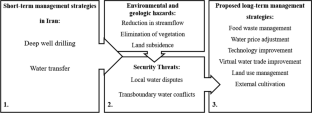Natural Hazards ( IF 3.7 ) Pub Date : 2024-04-22 , DOI: 10.1007/s11069-024-06589-y Omid Bozorg-Haddad , Mahdi Bahrami , Ayda Gholami , Xuefeng Chu , Hugo A. Loáiciga

|
The scarcity of global water resources has been exacerbated by a variety of factors, including population growth, the impacts of climate change, and mismanagement. Policymakers face a challenge in managing tradeoffs between human water demands and maintaining the world’s water resources. This study investigates water resource management strategies using Iran’s example, a country in the Middle East with arid and semi-arid climate. A review of water resources management strategies in Iran shows the country’s policies leaned more on short-term solutions. Short-term water management addresses immediate shortages and emergencies, implemented during droughts and water scarcity, while long-term strategies reduce water demand by addressing underlying drivers and involve significant investments and planning horizons. Iran has focused on implementing short-term solutions to address the effects of water scarcity on food and water security. This work shows that short-sighted water policies such as the large-scale use of water resources and water transfers may cause adverse impacts, among those land subsidence due to groundwater withdrawal and environmental degradation. It is worth noting that such short sighted water policies do not constitute sustainable solutions to water scarcity. On the other hand, water policies that seek long-term sustainability are frequently ignored by policymakers. The latter water policies are herein evaluated for the purpose of increasing water supply. Strategies such as improving water consumption patterns and setting reasonable water pricing can contribute to remedy the water crises in arid countries like Iran. An overview of case studies is presented and assessed to illustrate the effectiveness of long-term, sustainable, water supply policies.
中文翻译:

水资源管理策略的调查和分类:可能的威胁和解决方案
人口增长、气候变化的影响和管理不善等多种因素加剧了全球水资源的稀缺。政策制定者面临着平衡人类用水需求和维护世界水资源之间的挑战。本研究以中东干旱和半干旱气候国家伊朗为例,探讨水资源管理策略。对伊朗水资源管理战略的审查表明,该国的政策更倾向于短期解决方案。短期水管理是在干旱和缺水期间实施的,旨在解决眼前的短缺和紧急情况,而长期战略则通过解决潜在驱动因素来减少水需求,并涉及大量投资和规划范围。伊朗一直致力于实施短期解决方案,以解决水资源短缺对粮食和水安全的影响。这项工作表明,大规模利用水资源和调水等短视的水政策可能会造成不利影响,其中包括因地下水抽取和环境退化而导致的地面沉降。值得注意的是,这种短视的水政策并不能构成水资源短缺的可持续解决方案。另一方面,寻求长期可持续性的水政策经常被政策制定者忽视。本文对后面的水政策进行评估是为了增加供水。改善水消费模式和制定合理水价等策略有助于缓解伊朗等干旱国家的水危机。对案例研究进行了概述并进行了评估,以说明长期、可持续的供水政策的有效性。



























 京公网安备 11010802027423号
京公网安备 11010802027423号